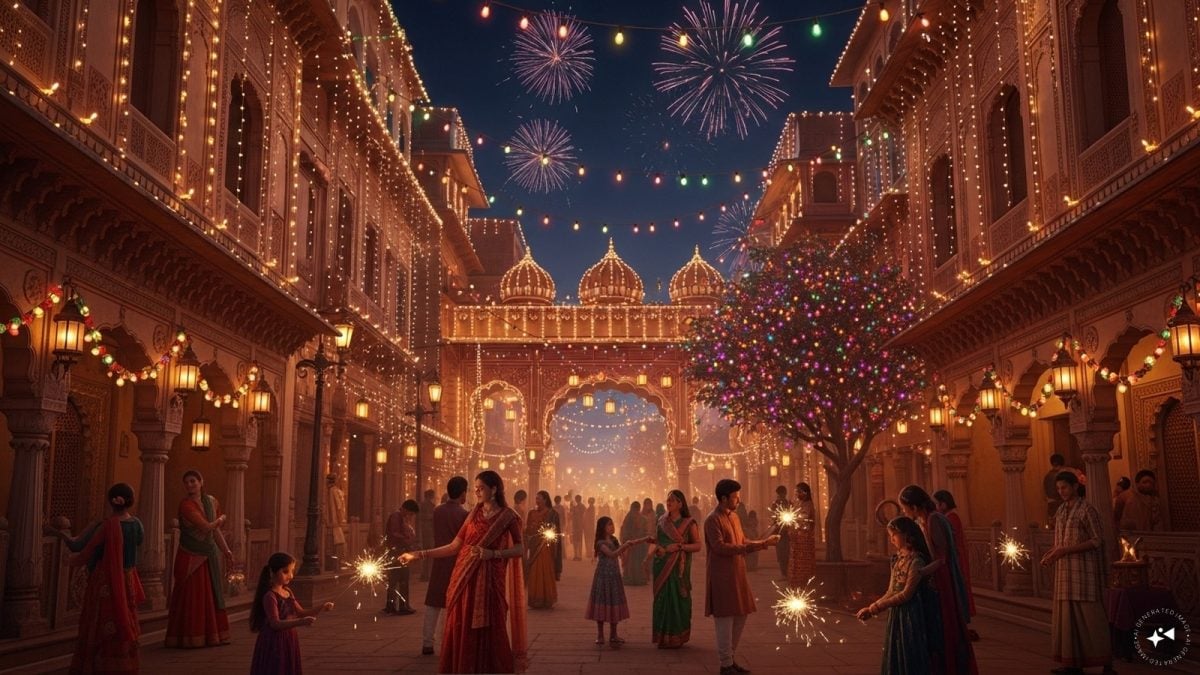Last Updated:
Diwali reminds us that light is powerful; it energises, heals, and inspires. But even light, when overdone, can disturb the body’s delicate chemistry

Diwali lights lift your mood, too much brightness at night can dim your natural sexual rhythm. (AI generated)
In this article we will explain how light exposure influences our body clock, stress levels, and intimate energy and how you can use the festive season to recharge your emotional and sexual wellbeing.
Diwali is all about illumination; diyas, fairy lights, and sparkling decorations. But while these lights bring joy and vibrancy, few realise they also have a biological impact on our bodies. Our brain is wired to respond to light and darkness through an internal rhythm called the circadian clock. This clock controls not only our sleep-wake cycle but also the release of hormones like melatonin, cortisol, and sex hormones (testosterone, estrogen, and progesterone). When this rhythm is disrupted by excessive artificial lighting at night, it can quietly affect mood, fertility, and sexual desire.
Light, Hormones, and the Libido Link
The hormone melatonin (often called the “sleep hormone”) plays a key role in regulating sexual health. It is produced by the pineal gland in darkness and helps the body rest, repair, and balance hormone levels. However, bright artificial light at night, especially the blue light from LED bulbs, phones, and screens — suppresses melatonin production.
Lower melatonin means:
Less restorative sleep
Increased cortisol (the stress hormone)
Disrupted balance of testosterone and estrogen
And these three combined can reduce libido, cause irritability, and increase fatigue. So ironically, while Diwali lights lift your mood, too much brightness at night can dim your natural sexual rhythm.
The Biological Chain Reaction
Here’s what science tells us happens inside your body:
Light enters the eyes → activates the suprachiasmatic nucleus (SCN), your brain’s master clock.
SCN signals the pineal gland → reduces melatonin release when light is detected.
Melatonin drop → raises cortisol, delays sleep, and alters reproductive hormones.
Hormonal imbalance → impacts mood, arousal, and even fertility.
In men, late-night light exposure can temporarily reduce testosterone levels. In women, it may disturb ovulation cycles and cause mood swings due to altered estrogen-progesterone balance.
Sexual desire is tightly linked to sleep quality. Similarly, poor sleep in men is associated with reduced testosterone, directly linked to lowered libido and performance anxiety. This means that your bedroom lighting and bedtime habits during festive nights can literally decide how connected or distant you feel from your partner.
The Emotional Side of Light
Light also affects mood through serotonin, a neurotransmitter that regulates happiness and calmness.
During Diwali, the combination of light, music, and social connection boosts serotonin and dopamine, our brain’s “feel-good” and “reward” chemicals. That’s why festive gatherings often feel energising and romantic, your brain is naturally flooded with positivity hormones. However, when late-night overstimulation continues for days (excess noise, flashing lights, caffeine, and sweets), it can reverse the effect causing irritability, anxiety, and fatigue. So, moderation is key: enjoy the glow, but let your brain rest too.
How Lighting Affects Intimacy
The body’s natural desire rhythm follows the light-dark cycle. Evening darkness promotes melatonin release, calming the mind and relaxing muscles, the ideal state for intimacy. Soft, warm-toned lighting enhances oxytocin (the bonding hormone) and reduces sympathetic nervous activity (the fight-or-flight response). That’s why candlelight dinners or dimly lit bedrooms are not just “romantic clichés”, they are scientifically soothing for the body and mind. Bright LED or fluorescent light, on the other hand, triggers alertness and cortisol, making it harder to relax or feel emotionally connected. So, this Diwali, as you decorate your home, remember: the right light can warm your connection, the wrong light can stress it.
How to Protect Your Hormonal Balance This Diwali
Dim the Lights After 10 PM: Let your body know it’s time to unwind. Use warm yellow lamps or traditional diyas in bedrooms instead of bright white LEDs.
Limit Screen Exposure Before Bed: Mobile and TV screens emit blue light that suppresses melatonin. Try switching off 30–45 minutes before sleeping.
Maintain a Regular Sleep Schedule: Festivals often disturb routines, but even small disruptions can impact hormones. Try sleeping and waking within the same hour window daily.
Don’t Skip Intimacy Due to Fatigue: Physical closeness can actually lower cortisol and improve sleep quality. Even cuddling or affectionate touch boosts oxytocin.
Mindful Eating and Hydration: Heavy sweets and late dinners affect digestion and sleep. Keep festive meals balanced, your gut health directly influences serotonin production.
Create a Romantic Light Zone: Use candles or fairy lights for a warm glow, your eyes and hormones both love it. Soft lighting helps activate relaxation pathways and intimacy.
The Perfect Balance: Light Outside, Calm Inside
Festivals symbolise joy, connection, and new beginnings. But in today’s overstimulated world, balance is key. Your body’s natural hormones – melatonin, serotonin, testosterone, and oxytocin; all thrive on rhythm, rest, and warmth. So, this Diwali, light your diyas, celebrate with laughter, but when night falls, let darkness do its healing magic. After all, some of the most beautiful connections happen not in bright light, but in gentle glow.
Diwali reminds us that light is powerful; it energises, heals, and inspires. But even light, when overdone, can disturb the body’s delicate chemistry. Let this festival be your cue to balance brightness with stillness, outside your home and inside your relationship. Because true radiance isn’t in the lamps we light, but in the calm, connected hearts that glow beside them.

Prof (Dr) Saransh Jain is the winner of the Swasth Bharat Rattan Award and is a Certified and Licensed Sexologist by the American Board of Sexology. He is currently a Senior Consultant at Dr SK Jain’s Burlingto…Read More
Prof (Dr) Saransh Jain is the winner of the Swasth Bharat Rattan Award and is a Certified and Licensed Sexologist by the American Board of Sexology. He is currently a Senior Consultant at Dr SK Jain’s Burlingto… Read More
October 19, 2025, 15:49 IST








